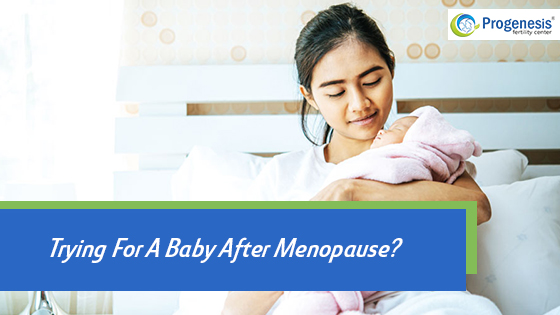Women’s fertility health naturally declines as they age, and after the age of 40, due to menopause, it becomes increasingly unlikely for them to conceive.
But “unlikely” does not mean “impossible!”
IVF after menopause makes conception and a healthy pregnancy achievable.
With advancements in reproductive technologies, menopausal pregnancy is possible using assisted reproductive technology, such as IVF!
Let us understand this better, starting with what menopause is.
What is menopause?
Menopause is a natural decline in the reproductive hormones of women as they age. For most women, this occurs somewhere between the ages of 40 and 55. During this time the female ovaries stop producing hormones, and menstrual periods stop.
But in some cases, where women have specific health conditions or have had certain types of medical treatment or surgery, menopause may begin at a younger age, this is known as premature menopause, which leads to female infertility.
Symptoms of menopause
If you are under the age of 45 and are experiencing the below symptoms, you might be going through the phase of early menopause:
- Irregular periods
- Decreased libido
- Vaginal dryness
- Hot flashes
- Infertility
- Insomnia
Menopause and the biological clock
Biologically, pregnancy after menopause is impossible, as a woman no longer produces eggs. Although eggs succumb to this biological clock, menopausal pregnancy is possible!
Conception, a healthy pregnancy, and delivering a healthy baby, everything is possible after menopause.
If you think that you might be undergoing menopause early and are hoping to have a baby, it’s necessary to get professional advice as soon as possible, because as women age i.e during the late 40s female infertility is at its peak.
According to Dr. Narhari Malagonakar, “choosing the right fertility team is essential, as the right team of expert doctors can run a series of tests to find whether you are really going through menopause. They will also help determine which treatment options work best for your situation and can also guarantee the success of IVF after menopause.”
Pregnancy after menopause
So, can women conceive after menopause?
Yes, With the help of IVF! Women who have gone through menopause can still get pregnant, whether menopause came early or at a more expected time.
It may sound confusing to many, even impossible. But with the advancements in fertility technologies, you can get pregnant after menopause.
How?
By using donor eggs, embryos, or your own eggs that you’ve frozen at a younger age.
Here’s how the process works
Egg donation: The intended mother, or recipient, is matched with a young healthy “egg donor”, after which the partner’s sperm (or a donor’s sperm) are collected, and are artificially fertilized through the process of IVF or Intracytoplasmic Sperm Injection (ICSI). These developing embryos are then transferred into the uterus.
Embryo donation: Embryo donation is utilized when a couple cannot conceive through IVF technology using their own egg and sperm. In the process, the donor egg and sperm are cultured artificially in the lab through IVF and the healthy embryos are transferred to the uterus.
Cryopreservation/ Egg freezing: Women today are choosing to have children later in life than ever before. Egg freezing can enable a woman to delay pregnancy until a later stage as the process offers a chance to preserve eggs before they are all depleted.
In this procedure, eggs harvested from your ovaries are frozen, unfertilized, and stored for later use. These frozen eggs can be further used and fertilized in the IVF process to ensure a healthy pregnancy.
“But in the above processes, women may have concerns about the uterus and uterine health, mentions Dr. Malagonakar, they are concerned whether the uterus will support the pregnancy or not!
Even though the ovaries are not functioning and producing hormones, we can prepare the uterus externally.
We use hormones like estrogen and progesterone to thicken the lining of the uterus to mimic pregnancy so that we can put an embryo inside the uterus that the uterus will accept.”
Age is not a limit, menopause is not an end
Just because you’re in menopause doesn’t mean your desire for becoming a mother vanishes. To avoid any complications in the future, it’s necessary to talk to the right fertility doctor and get your fertility checked at a younger age.
We live longer, we wait to have kids. Most people have menopause at 50, but some reach it at 40. That’s normal. It’s biology. There’s nothing wrong with you!
There’s a solution for every problem, and also for menopause.
Advances in fertility technologies and IVF have now made it much easier to achieve your parenthood dream.
While everyone’s motherhood journey is different, we believe every woman deserves to become a mother irrespective of her age.
Let’s help the ladies who have missed their chance at motherhood.
Give motherhood a chance with IVF. At Progenesis Fertility Center, our IVF experts offer the best fertility healthcare solutions to all complications and help you achieve your dream family.
Come, give motherhood a chance at Progenesis Fertility Center. Experience the bliss of a happy family!
Start your parenthood journey with an online fertility consultation!

